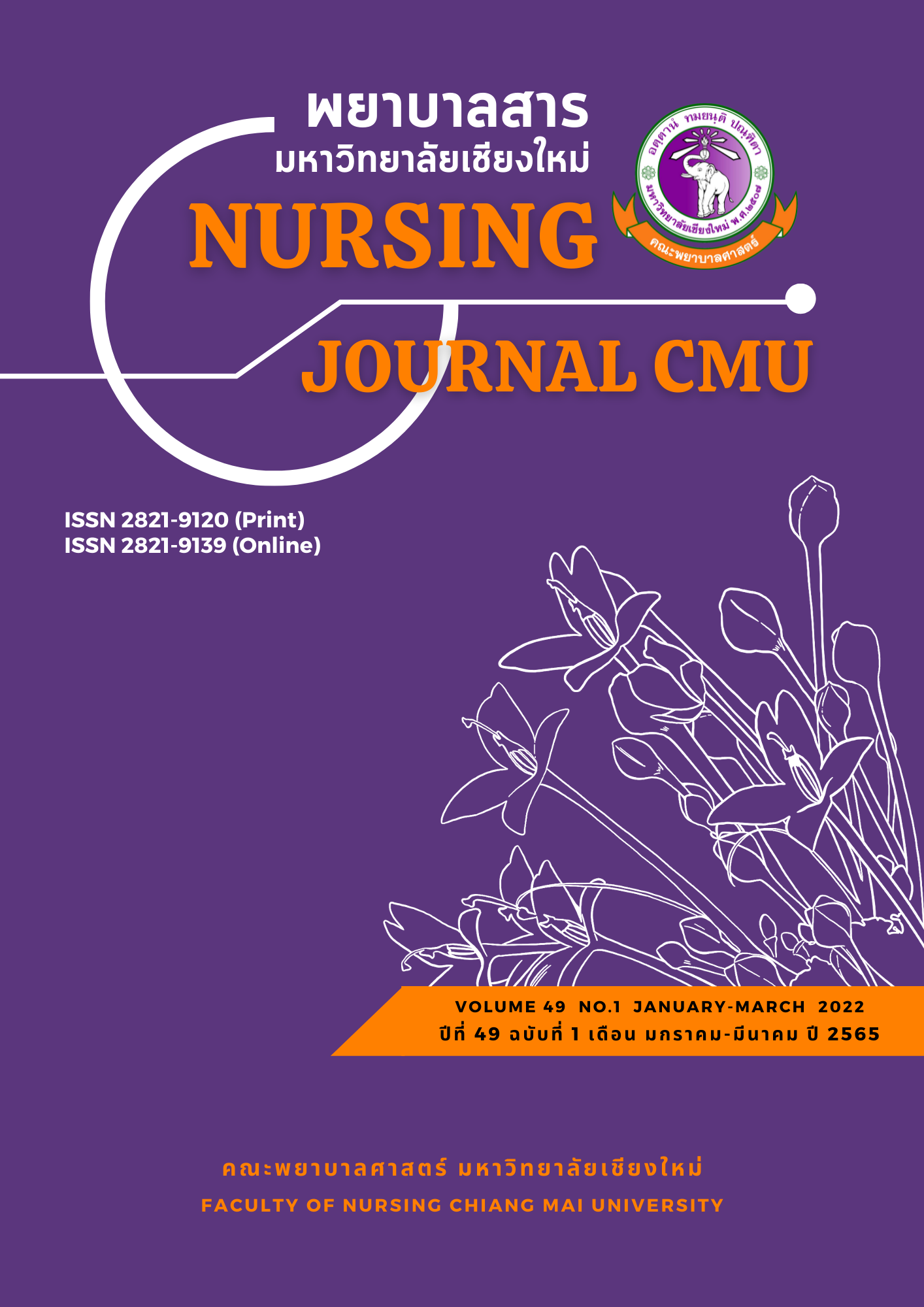The Effects of a Social Support Program on Adherence to Hypertension Control Behaviors and Clinical Outcomes Among Chronic Kidney Disease Patients Receiving Hemodialysis
Keywords:
Social support program, Hypertension, Clinical outcomes, Chronic Kidney Disease Patients Receiving HemodialysisAbstract
This quasi-experimental research aimed to determine the effects of a social support program on adherence to hypertension control behaviors and clinical outcomes in chronic kidney disease patients receiving hemodialysis. The sample for this study were 28 end-stage renal disease (ESRD) patients receiving hemodialysis at The 60th Anniversary HRH Princess Maha Chakri Sirindhorn Dialysis Center in Thammasat University Hospital from April to July 2021. The instruments for collecting data included 1) a personal data questionnaire, 2) an illness and hemodialysis data questionnaire, 3) a hypertension control behavioral assessment, and 4) a hypertension control knowledge assessment. The instruments were tested for validity and reliability. Data were analyzed using descriptive statistics, paired t-test, and Wilcoxon matched pairs signed rank test.
The findings showed that the mean score of knowledge in controlling hypertension was significantly greater than prior to attending the program (p < .05). The mean score of the adherence to hypertension control behaviors was significantly higher than the mean score before attending the program (p < .05), and the mean systolic blood pressure and diastolic blood pressure were significantly decreased after attending the program (p < .05).
This study showed that the social support program implemented by families and medical personnel improved patients’ adherence to hypertension controlling behaviors which resulted in reduction of systolic and diastolic blood pressure.
References
House, J. S. (1981). Work stress and social support. Glenview, IL: Addison-Wesley.
Intaboot, K. (2020). The effect of a self-management and social support program on newhypertension cases with uncontrolled blood pressure. The Office of Disease Preventionand Control 9th Nakhon Ratchasima Journal, 26(1), 73-83. (in Thai)
Kara, B., Kayser, K., & Kilic, S. (2007). Nonadherence with diet and fluid restrictions and perceived social support in patient receiving hemodialysis. Journal of Nursing Scholarship, 39(3), 243-248.
Kim, B., & Kim, J. (2019). Influence of uncertainty, depression, and social support on self-care compliance in hemodialysis patients. Journal Therapeutics and Clinical Risk Management, 15, 1243-1251.
Konyanee, S., & Tassana-iem, S. (2019). The effect of the application of food, exercise, emotion,non-smoking, alcohol cessation and social support to reduce the risk of diabetes and hypertension among new risk groups. Ratchaphruek Journal, 17(2), 95-104. (in Thai)
Kotchasenee, P. (2017). Essentials in hemodialysis (4th ed.). Bangkok: Text and Journal. (in Thai)
Moran, P. J., Christensen, A. J., & Lawton, W. J. (1997). Social support and conscientiousness in hemodialysis adherence. Annals of Behavioral Medicine, 19(4), 333-338.
Nawsuwan, K., Singhasem, P., & Yimyearn, Y. (2016). Relationship and the predictive power of social support on the practice of hypertensive patients. Boromarajonani College of Nursing, Uttaradit Journal, 8(1), 1-13. (in Thai)
Sakulkoo, S., Wisitchainont, W., & Kankran, W. (2020). Factors influencing quality of life in end-stage renal disease patients receiving continuous ambulatory peritoneal dialysis. Journal of Nursing and Health Care, 48(3), 117-126. (in Thai)
Srisatidnarakul, B. (2010). The methodology in nursing research Bangkok: U & I inter media. (in Thai)
Sumthong, P., Suthiphongkiart, B., Kleebpratoom, P., & Oadpakdee, W. (2019). The effect of home blood pressure monitoring program applying transtheoretical model and social support power in hypertensive patients, Angthong Hospital. Journal of Prachomklao College of Nursing, Phetchaburi Province, 2(1), 1-14. (in Thai)
Tantiekkarat, S., Makmee, P., Suksanguam, N., & Sattaphan, N. (2020). Factors associated with self-care behaviors of the elder with hypertension in buriram province by using the precede framework theory. VRU Research and Development Journal Science and Technology Group 2, 15(1), 59-74. (in Thai)
The Nephrology Society of Thailand. (2015). Clinical practice recommendation for the Evaluation and management of chronic kidney disease in adults. Retrieved from http://www.nephrothai.org (in Thai)
Tiparat, W., Suwanweala, S., Singhasem, P., & Mengaied, S. (2018). The effects of a self–management supporting program on management of blood pressure among patients at-risk for stroke in muang district, trang province. The Southern College Network Journal of Nursing and Public Health, 5(2), 70-85. (in Thai)
Downloads
Published
How to Cite
Issue
Section
License
Copyright (c) 2022 Nursing Journal

This work is licensed under a Creative Commons Attribution-NonCommercial-NoDerivatives 4.0 International License.
บทความที่ได้รับการตีพิมพ์เป็นลิขสิทธิ์ของวารสารพยาบาลสาร
ข้อความที่ปรากฏในบทความแต่ละเรื่องในวารสารวิชาการเล่มนี้เป็นความคิดเห็นส่วนตัวของผู้เขียนแต่ละท่านไม่เกี่ยวข้องกับมหาวิทยาลัยเชียงใหม่ และคณาจารย์ท่านอื่นๆในมหาวิทยาลัยฯ แต่อย่างใด ความรับผิดชอบองค์ประกอบทั้งหมดของบทความแต่ละเรื่องเป็นของผู้เขียนแต่ละท่าน หากมีความผิดพลาดใด ๆ ผู้เขียนแต่ละท่านจะรับผิดชอบบทความของตนเองแต่ผู้เดียว






